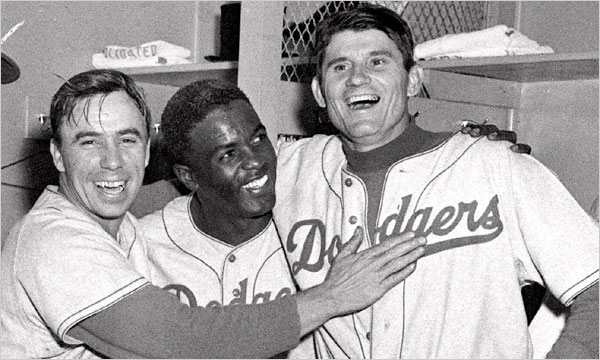Subscribe to my blog for automatic updates and Free Bonus Reports: “Memorable World Series Moments” and “Gary’s Handy Dandy World Series Reference Guide.”
“Preacher” Roe Photo Gallery
Click on any image below to see photos in full size and to start Photo Gallery:
Brooklyn Dodger Collectibles on Amazon Baseball Books from Amazon
Another Edition Of “Baseball’s Forgotten Stars: “Preacher” Roe!
“Preacher, how do you account for your longevity?” “Simple…Clean living and the spitball!”- Preacher Roe explaining how he was still pitching at age 39.
“It never bothered me none throwing a spitter. If no one is going to help the pitcher in this game, he’s got to help himself!” –Preacher Roe, commenting on his “Money Pitch”
“Sometimes you eat the bear and sometimes the bear eats you!” –Preacher Roe, commenting after once being taken out of a game in the second inning.
Thanks to our reader, Frank Barning, for suggesting Preacher Roe for our series on “Basaeball’s Forgotten Stars.” As the above quotes attest, Elwin “Preacher” Roe was one of baseball’s genuine characters. I thought of him while doing my recent post on “Schoolboy” Rowe: two folksy Arkansans with the same last name (although spelled differently), flaky personalities, and two of the best baseball nicknames ever.
In the featured photo below, we see Preacher (right), with Dodger teammates PeeWee Reese and Jackie Robinson celebrating in the clubhouse after a World Series win.
While both “Schoolboy” and “Preacher” were exceptional pitchers, there was one glaring difference: Schoolboy Rowe was an outstanding hitter with a career .263 life-time batting average; whereas Preacher Roe was one of the worst hitters ever, coming in at .110. In a scene reminiscent Bartolo Colon’s home run last year, Preacher Rowe hit the only home run of his career at Forbes Field in 1953, causing Dodger broadcaster Red Barber to quip: “Well, old Number 28 has hit a home run, and we’ll never hear the end of it, folks!”
Roe’s unique baseball nickname “Preacher” came at age 3 when an uncle asked his name. Little Elwin responded “Preacher” because of a minister who would take him on horse-and-buggy rides. The name stuck and became one of the games’ most endearing. While his wirily 6-foot-2, 170-pound frame, sharp facial features, and penchant for spinning yarns in his backcountry twang projected the appearance of a “county bumpkin,” Roe was actually a college graduate. He gained national attention at Harding College in 1939 by striking out 26 batters in a 13-inning game.
Preacher Roe played 12 seasons in the majors (1938-’54) after being signed by Branch Rickey. He broke in with the Cardinals in 1938, and pitched in one game, giving up six hits and four runs in 2⅔ innings. He spent the next five seasons in the Cardinals’ minor league system, and then later played for the Pirates (1944-’47). In 1949, Branch Ricky, now the General Manager of the Dodgers, reacquired Roe in a trade that worked out pretty well for the Dodgers: Preacher Roe and Billy Cox, the brilliant-fielding third baseman, for an aging Dixie Walker and two others.
Preacher is primarily remembered for his highly successful years with the Dodgers (1949-’54). He had winning seasons his first six years, with a “break-out” year in 1949, going 15-6. Between 1951 and 1953, he went 44-8. His best year was 1951 when he posted a 22-3 record (a league-leading .880 winning percentage), with a 3.04 ERA over 257 innings. He started the season 10-0, becoming only the fifth pitcher since 1916 to do so. He was featured prominently in Roger Kahn’s classic: “The Boys of Summer,” and “Carl Erskine’s Tales from the Dodgers Dugout: Extra Innings.” Erskine once shared some observations about his Dodger teammate: “The Preach was a master of his craft. He was a smart control pitcher with a phenomenal sense of timing.”
Over his career, the five-time All-Star went 127-84 (.602), with a 3.43 ERA, 956 strikeouts, 17 shutouts, and 101 complete games. Known for his outstanding control, he compiled an exceptional career 1.90 strikeouts-to-walks ratio. He led the National League in strikeouts in 1945 (148), and was a star pitcher on three pennant winners (1949, ’52,’53). In five post-season games, he went 2-1, with a 2.54 ERA.
What would Roe’s career numbers be like if he hadn’t spent four seasons with the Pirates, who, at the time, were probably the worst team in baseball? We’ll never know. The quick-witted Roe once contrasted the fielding of the Dodgers with that of the Pirates, saying: “A pitcher should pay to pitch for the Dodgers, whereas the Pirates’ second baseman and shortstop were like goalposts with the ball bouncing between them!”
After baseball Preacher Roe settled in West Plains, Missouri where he ran a small grocery store for many years. He died on November 9, 2008, aged 92,after a battle with cancer.
Gary Livacari
Visit our On-Line Sports Memorabilia Store
Photo Credits: https: All from Google search
Information: Excerpts edited from the Preacher Roe Wikipedia page.
“We are a participant in the Amazon Services LLC Associates Program, an affiliate advertising program designed to provide a means for us to earn fees by linking to Amazon.com and affiliated sites.” Click here to view Amazon’s privacy policy

